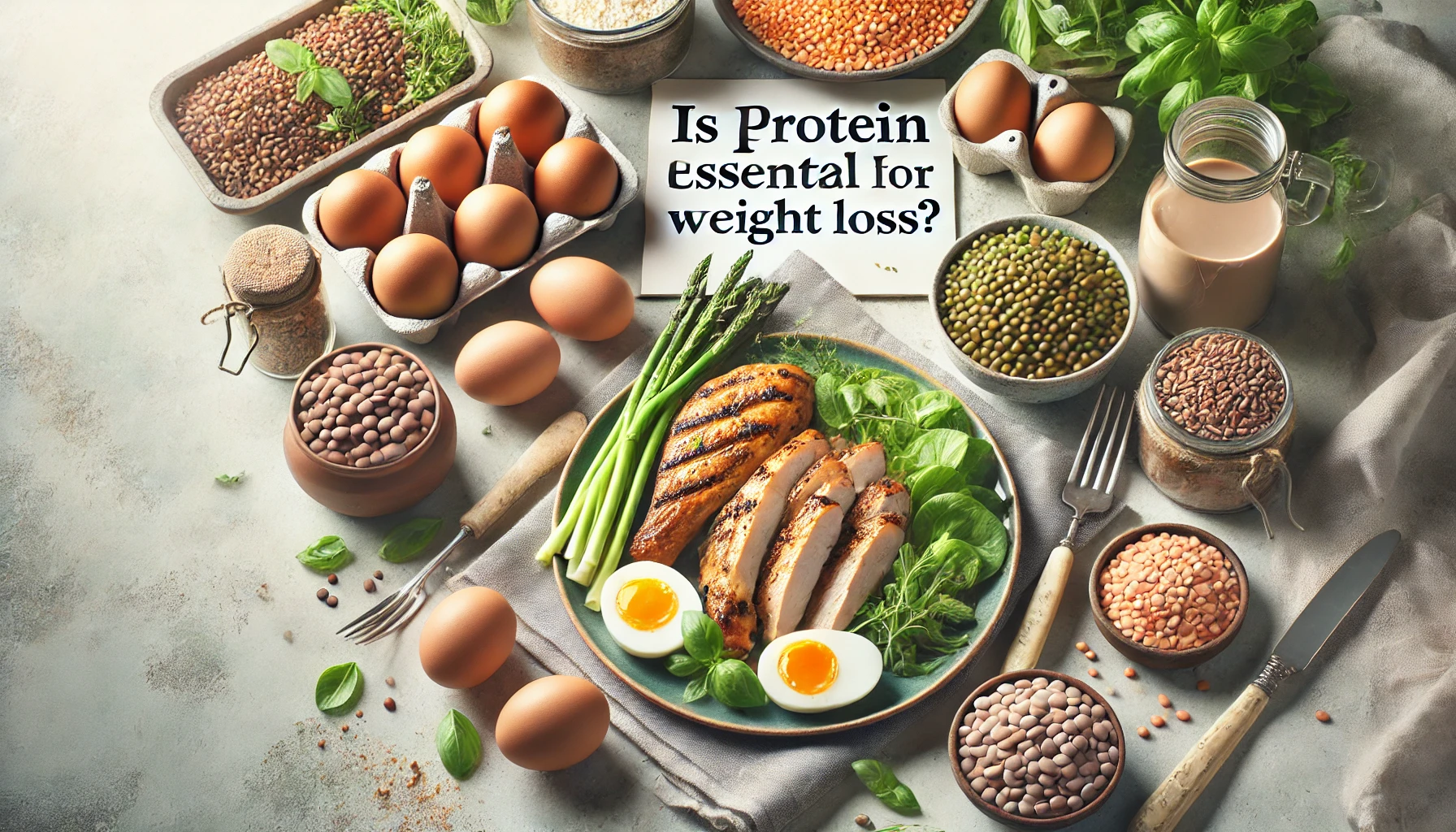
Is Protein Essential for Weight Loss?
Introduction
When it comes to “weight loss”, there’s a lot of focus on counting calories, cutting carbs, and boosting workouts. But where does protein fit into the picture? Protein, one of the most crucial macronutrients, has proven to be highly effective in supporting weight loss and maintaining lean body mass. But is it essential? Let’s dive in and break down the role of the protein plays in weight loss.
How Protein Affects Your Metabolism
Boosting Metabolic Rate
Protein plays a main role in stimulating the body’s metabolism. Unlike fats and carbohydrates, protein requires more energy to digest. This boost in energy expenditure can increase the body’s calorie-burning process.
Thermic Effect of Food (TEF) and Protein
Protein has the highest thermic effect among the macronutrients, meaning the body expends more calories digesting protein than it does for carbs or fats. This process called the “Thermic Effect” of Food (TEF), contributes to increased metabolism and helps create a calorie deficit for weight loss. Learn more…
Protein for Appetite Control and Satiety
Why Protein Keeps You Fuller, Longer
One of the significant benefits, of protein is its ability to keep you full for longer periods. When compared to carbs and fats, protein is more filling, making it easier to manage cravings and portion sizes.
Impact on Hunger Hormones
Protein consumption can influence hormones like ghrelin and GLP-1, which control hunger and appetite. By impacting these hormones, protein can help reduce cravings, making it easier to stick to a “healthy” eating plan.
Types of Protein for “Weight Loss“
Animal-Based Protein Sources
Animal-based sources like chicken, turkey, fish, eggs, and lean meats are considered complete proteins because they contain all the essential amino acids required for the body.
Plant-Based Protein Sources
For those on plant-based diets, options like lentils, chickpeas, tofu, and quinoa are excellent sources of protein. Combining different plant-based proteins can also help achieve a complete amino acid profile.
Complete vs. Incomplete Proteins
Complete proteins provide all essential amino acids, while incomplete proteins do not. While animal proteins are generally complete combining plant-based options can also cover your amino acid needs.
Ideal Protein Intake for Weight Loss
Recommended Daily Intake
The recommended daily protein intake varies, but for “weight loss” it generally falls between 1.2 to 1.6 grams per kilogram of body weight. This can differ based on individual needs and activity levels.
Calculating Protein Needs Based on Weight and Goals
To calculate protein needs, consider weight, age, activity level, and specific “weight loss” goals. A professional nutritionist can provide precise recommendations for individual needs.
Protein Timing and Meal Planning
Benefits of Protein-Rich Breakfasts
Starting the day with a protein-rich breakfast can prevent mid-morning cravings and maintain energy levels. Studies show that protein at breakfast helps manage hunger better than other macronutrients.
Spacing Protein Throughout the Day
Distributing protein intake evenly across meals can optimize muscle protein synthesis and keep metabolism active throughout the day. Aim to include a source of protein in every meal for balanced energy.
Combining Protein with Exercise
Protein and Muscle Retention
During “weight loss” retaining, lean muscle is crucial. Protein helps prevent muscle loss, ensuring the weight lost is primarily fat, not muscle.
How Protein Enhances Workout Recovery
Protein is vital for post-workout recovery. After working out, consuming protein assists, fixing and working with muscling tissue, fundamental for strength and perseverance after some time.
Risks of Excessive Protein Intake
Impact on Kidney Health
While protein is essential, excessive amounts can strain the kidneys, particularly for individuals with pre-existing kidney conditions. It is essential to monitor intake and maintain a balanced diet.
Potential for Nutrient Imbalance
High-protein diets may limit the intake of nutrients like fiber, leading to digestive issues and other health concerns. A balanced approach is critical for overall wellness.
Conclusion
In conclusion, protein is a highly beneficial nutrient for “weight loss”. It aids in boosting metabolism, controls appetite, preserves muscle mass, and supports workout recovery. However, balance is crucial. While protein is essential, overconsumption can pose health risks. Focus on getting enough protein from diverse sources, and tailor your intake to your needs and goals for the best results.
FAQs
1. What are the best sources of protein for “weight loss”?
The best sources include lean meats, fish, eggs, legumes, dairy products, and certain plant-based proteins like quinoa and lentils.
2. Can you lose weight without eating protein?
Weight loss is possible without focusing on protein, but retaining muscle and controlling hunger is harder. Protein is beneficial in supporting a healthier, sustainable weight loss journey.
3. How does protein affect belly fat?
While protein doesn’t specifically target belly fat, it helps with overall fat loss by supporting a calorie deficit, which can eventually reduce abdominal fat.
4. Is a high-protein diet safe for everyone?
Most people can safely enjoy a high-protein diet, but those with kidney issues or specific health conditions should consult a healthcare provider.
5. How can I increase my protein intake without supplements?
For a natural protein boost, try adding more protein-rich foods like lean meats, dairy, eggs, beans, and lentils to your meals.

Leave a Reply